每日观察:关注Android Market应用数据分析(8.12)
1)据彭博社报道,芬兰开发商Rovio日前正筹备新一轮融资,该公司估值可能达到12亿美元。
Rovio全球品牌营销主管Wibe Wagemans曾在上月的GamesBeat 2011大会上公开表示,Rovio希望快速发展,他们一直都在准备筹集资金。该公司在今年三月已融资4200万美元,目前在芬兰有50名成员。
2)据彭博社报道,任天堂投资者不满该公司坚持30年如一日地开发掌机游戏的运营策略,已开始要求任天堂开拓智能手机游戏业务,但该公司尚未对此做出回应。
报道指出,新款任天堂掌机设备市场表现不济,在美国发布首月销量不足100万部,迫使该设备在美国削价32%,在日本降价40%。而任天堂在数周前曾表示,3DS设备销量欠佳的原因在于该平台缺乏高质量的游戏,希望能够通过今年末发布的《Super Mario 3D Land》、《Star Fox 3D》、《Mario Kart 7》和《Kid Icarus:Uprising》弥补这一点。
任在堂3DS至今为止在全球的总销量为430万部,但苹果仅在上个季度就售出2030万部iPhone,754万部iPad Touch,925万部iPad。Gartner移动分析师Michael Gartenberg表示,对许多用户来说,手机或平板电脑才是目前最方便易用的移动游戏设备,并且其游戏相对更为平价,任天堂确实该考虑转变其游戏运营策略。
3)Gartner近日发布2011年第二季度手机销量报告指出,谷歌和苹果仍是智能手机市场的领头羊,这两者在第二季度所占市场份额将近62%,比去年同期的31%翻了一倍。
谷歌Android智能手机在该时期所占市场份额达43.4%,而去年同期仅为17.2%;苹果该时期的份额为18.2%,去年同期所占比例为14.1%。Symbian市场份额已从去年的40.9%下跌至当前的22.1%;RIM智能手机市场份额也从去年的19%下滑至今年的12%。
Gartner指出,今年第二季度全球移动设备销量增幅为16.5%,共达4.287亿部。智能手机销量同比去年增长74%,占第二季度所有移动设备销量的25%(去年同期的比例为17%)。
4)《VegasTower》开发者Kathy Fung日前公布,这款游戏下载量已达100万次,每日DAU达5万,其中多数为iPad用户((游戏邦注:该游戏今年3月份先发布iPad版本,其后才推出了iPhone版本)。
最值得注意的是,该游戏付费玩家平均消费金额达40美元。这款游戏有两种虚拟货币,即cash和favors,其中最贵的货币包选项售价高达99.99美元。
与之形成对比的是另一家独立开发商NimbleBit推出的《Tiny Tower》,其下载量已超过200万次,它的IAP(应用内置付费功能)转化率为3.8%,约45%的付费用户购买的是99美分/10个bux(游戏虚拟货币)选项,有50%选择的是4.99美元/100个bux,5%以下的用户购买29.99美元/1000个bux。
5)据venturebeat报道,日本手机社交游戏巨头DeNA日前向苹果App Store发布了Mobage应用,支持用户通过iPhone和iPod Touch访问其社交平台。与此同时,其竞争对手Gree正向中国游戏开发商上海灵禅(UltiZen Games)投资。
Mobage目前已有3000万手机用户,一年时间内为DeNA创造13亿美元收益,但这些用户多为功能性手机使用者,并非iPhone等智能手机用户,DeNA看到了其发展的局限性,并加快了向智能手机领域进军的步伐。
Gree在日本共有2600万用户,不久前在美国收购了手机社交游戏平台OpenFeint,并与新加坡社交平台Migg33和中国腾讯结盟。上海灵禅是中国最大的网页及智能手机游戏开发商之一,在上海、北京和东京共有450名成员,Gree收购了该公司140万股普通股,这笔交易将在本月结束。
6)俄罗斯开发商ZeptoLab日前宣布成立英国伦敦工作室,并任命Zuy Spartak担任新工作室主管。该公司于2010年10月推出的《割绳子》至今已收获900万次付费下载量,并于今年6月推出Android版本,各个版本的总下载量已达4500万次。
该游戏的继集版本由ZeptoLab自主发行,并收回了《割绳子》Android版本的发行权。这款游戏原发行商Chillingo表示,ZeptoLab的业务发展不会影响两家公司的合作关系,他们仍将共同为原版游戏添加更新内容。
7)《Paradise Island》是一款常占据Android Market营收榜单前列的游戏(发布仅几个月),该游戏由默默无闻的Cooper Media Group工作室推出,但其背后支持者却是莫斯科Game Insight公司(近日向Android平台推出了新游戏《My Country》)。
Game Insight是一家由5名俄罗斯女性运营的公司,已经在俄罗斯及其他前苏联国家成立11家游戏工作室。据该公司所称,这款居于Android Market营收榜单第一名的游戏(不包括广告收益),每月净收益超过100万美元(已扣除支付给Android Market的佣金)。
该公司业务开发经理Darya Trushkina表示,由5个女人来管理300多名男性开发者的情况确实有点好笑和反常,但这丝毫不影响项目的正常运营。
该工作室成立已有两年,创始人是Alisa Chumachenko,她曾是已被Mail.ru并购的MMO游戏公司Astrum Online Entertainment的市场营销主管(游戏邦注:Astrum曾获得Facebook和Zynga投资者DST的支持)。该公司目前已向25个社交网站投放了17款游戏,其游戏收益需分别与iOS、Facebook和Android进行30%的抽成,另外还要向其他俄罗斯社交网站支付相关佣金。
Game Insight在Android平台的主要竞争对手包括Storm8、Glu Mobile和Com2Us,据Trushkina所称,《Paradise Island》的用户是自然积累而得,并非通过广告或奖励推广模式等付费渠道而获取。
8)应用排名分析搜索公司Mobilewalla最新数据指出,Android Market的发展主要得益于一部分高产稳产应用开发商的贡献,并且该应用商店每款应用的平均更新频率也高于App Store。
根据Mobiewalla今年5月份的数据显示,产量超过100款应用的Android开发商所推出应用数量,在该应用商店所占比例高达53%。这一数据是App Store同类开发商的两倍,后者在App Store的产品数量所占比例为23%。这种现象表明,尽管Android Market发展迅速,但主要推动力量却是为数不多的一小群开发商。
调查还发现,平均每款Android应用的更新次数是0.8次,而iOS应用的同一数据却是0.3,这表明Android开发商更新应用频率比iOS同行高两倍。该公司称Android应用的高更新频率,并不代表Android应用存在更多漏洞,因为在这两个平台名列前茅的应用所获得的评价都很高,唯一可以解释的理由就是,Android开发商更勤快。
但观察者指出,这或许与Android平台分裂性问题,以及Android Market无需应用审核流程有关。由于Android分裂性问题,许多开发者不得不在多种设备上进行测试,不断推出更新版本以便获得更多用户。另外Andorid Market不像App Store拥有严格的应用审核流程,这实际上提高了开发者更新产品的效率;而App Store则因复杂苟刻的审核流程,迫使开发者每推出一次更新版本都要极为谨重,这实际上间接降低了开发者的更新效率。
Mobilewalla观察还发现,在Android和iOS排名前列的产品使用率更高。在Android Market前30名应用平均收获的评价介于1.1万至2万条之间,而App Store前30名应用所得评价约为6000条。但如果看30名之后的210款Andorid Market应用,就会发现每款应用所获评价跌至几百条,而苹果的同名次产品仍有2000至6000条评价。
这种情况表明,由于曝光度不足,或者低质量原因,Android用户很难看上排名较低的应用,这也意味着Andorid开发者若不能攀上较高名次,就基本难以在Android平台立足。
该项调查还显示,在Android Market较受欢迎的应用类型是办公应用、社交网站和实用工具,而在App Store则是娱乐、生活方式、金融和体育类应用更受欢迎。(本文为游戏邦/gamerboom.com编译,如需转载请联系:游戏邦)
1)Angry Birds maker Rovio seeks $1.2B valuation in upcoming funding round
Matthew Lynley
Angry Birds maker Rovio is in the process of a fundraising round that would value the company at $1.2 billion, according to a report by Bloomberg.
That would make the company that specializes in casual games worth more than Plants vs. Zombies casual game maker PopCap, which games publisher Electronic Arts bought for $750 million. It’s still well short of social games maker Zynga, which is valued somewhere between $10 billion and $20 billion and is looking to raise up to $1 billion in its upcoming initial public offering.
Rovio’s head of global brand advertising Wibe Wagemans hinted that the company was raising money at VentureBeat’s GamesBeat 2011 conference in San Francisco last month.
“We’re in fast growth mode, so we’re always on the lookout for good money,” Wagemans said. “We’re always interested.”
Angry Birds is a popular game on mobile devices where players fling birds at structures to try to destroy pigs. It started on smartphones like the iPhone and on tablets like the iPad. It has since expanded to a large number of other platforms like web browsers and TV boxes that are powered by operating systems like Android.
The company finished raising its last round of money – $42 million — in March this year. Rovio has been expanding through 2010 and 2011 and currently has 50 employees in Finland.(source:venturebeat)
2)Why Nintendo should start making games for iPhone and Android
Sean Ludwig
Nintendo investors are extremely unhappy with the company’s nearly 30-year old strategy of making games only for its own consoles and have started demanding the company make games for smartphones as well, according to a Bloomberg report.
Nintendo did not immediately respond with official comment.
Investors should rightfully be dissatisfied. The new 3DS handheld has had poor sales, with less than a million units sold in the U.S. in its first months. This prompted an unprecedented, desperate 32 percent price cut in the U.S. and a 40 percent price cut in Japan. The biggest problem with 3DS sales, Nintendo said a few weeks ago, is that it doesn’t have enough high-profile games. It hopes to correct that later this year with the release of Super Mario 3D Land, Star Fox 3D, Mario Kart 7, and Kid Icarus: Uprising.
Then there’s the underwhelming Wii U, which looks more like a small upgrade to the Wii rather than an entirely new console. While the Wii was extremely successful in selling units on its motion control scheme, it wasn’t nearly as strong in game sales. Sony’s PS3 and Microsoft’s Xbox 360 both look poised to keep churning out good game experiences for the next few years, while Nintendo’s next offering hardly increases power and only adds in a gimmicky touch-screen controller.
However, Nintendo President Satoru Iwata has said in the past the Japan-based company will only make games for its own devices as long as he’s in charge, showing a frustrating inflexibility to realize the challenges of the next few years. Nintendo has sold 4.3 million 3DS units worldwide so far, but Apple alone last quarter sold 20.3 million iPhones, 7.54 million iPods, and 9.25 million iPads. Think of how many more potential customers there are to sell games to.
“For many consumers, the phone or tablet is now the mobile game console of choice without the need to carry cartridges or disks and a much lower average price per game,” Gartner mobile analyst Michael Gartenberg told VentureBeat. “Given Nintendo’s strong intellectual gaming properties, it’s certainly something they need to consider and how their software business can grow relative to their hardware business.”(source:venturebeat)
3)Gartner: Android OS Sales Top iOS, RIM and Nokia
Sarah Perez
Gartner just released its new mobile device sales for Q2 2011, and reports that Google and Apple are the “obvious winners” in the smartphone ecosystem. The combined share of iOS and Android doubled nearly 62% in the second quarter of this year, up from just over 31% in same quarter last year.
Google’s mobile operating system now accounts for 43.4% of all smartphone sales, up from 17.2% Q2 2010. And Apple reached 18.2%, up from 14.1% at the same time.
However, Symbian is now at 22.1%, down from 40.9%.
Nokia and RIM are both suffering, actually, with Nokia’s sales in the channel dropping due to decreasing demand for Symbian, but also inventory management issues in Europe and China. RIM, meanwhile, saw its share of the smartphone market drop to 12% in Q2, from 19% one year ago.
According to the analyst firm, worldwide sales of mobile devices grew 16.5% from this time last year, to reach 428.7 million units. Sales of smartphones were up 74% year-over-year and accounted for 25% of the overall sales in Q2 2011, up from 17% in Q2 2010.
“Smartphone sales continued to rise at the expense of feature phones,” said Roberta Cozza, principal research analyst at Gartner. In mature markets, she noted that people were choosing Android over feature phones, in part due to manufacturer and carrier promotions.(source:techcrunch)
4)Freemium iOS hotel builder VegasTowers does 1 million downloads; average IAP is $40
by Jon Jordan
While Tiny Tower has been taking the headlines as the most successful indie freemium game of the moment, the market is wide enough to spread success around.
Kathy Fung, developer of VegasTowers, a similar tower building game that was released back in March for iPad (an iPhone version has out come since), has revealed some interesting numbers of her own.
Total downloads for the combined releases have topped one million, with 50,000 daily active players, with most playing on iPad.
What’s more significant however is the average amount spent by players is a whopping $40.
The game has two in-app currencies – cash and favors – with the most expensive single denomination for both is $99.99.
The other one
In comparison, NimbleBit’s Tiny Tower has now been downloaded over two million times.
It has an IAP conversion rate of 3.8 percent, with around 45 percent of buyers spending 99c on 10 bux, around 50 percent spending $4.99 on 100 bux and under five percent spending $29.99 on 1,000 bux.(source:pocketgamer)
5)Japanese mobile game companies make their own strategic moves
Dean Takahashi
A lot of attention focused on the social gaming war today between Facebook and Google, but in Japan there’s a lot of action in the rivalry between the two mobile social game networks.
DeNA announced today that it has launched its Mobage app the Japanese version of Apple’s Apple Store, bringing its mobile social game network to iOS iPhone and iPod Touch users. Meanwhile’s Japan’s Gree made a strategic investment in UltiZen Games, a game developer and outsourcing firm in China. Mobage is DeNA’s mobile social network for game fans in Japan. If you think of this rivalry as Google versus Facebook, but in mobile games, then you wouldn’t be so far off.
DeNA’s Mobage app is a big deal because the company has built up an audience of 30 million mobile phone users who pay a lot of money for apps and virtual goods, generating revenues for DeNA of $1.3 billion a year. But most of those users are on traditional feature phones, not newfangled smart phones like the iPhone. DeNA sees the writing on the wall so it’s moving fast into smartphones; that was one of the reasons that it bought Ngmoco for up to $403 million last year.
The Mobage app is a native iOS app, which will have more dynamic features available than an existing browser-based Mobage site. DeNA also launched a series of games on the Japanese App Store on Thursday: Solitaire, Reversi and Ninja Royale. DeNA launched a global English-language version of Mobage recently on the Android platform.
Gree’s move is interesting because it shows that it is also on a global expansion similar to DeNA. Gree has 26 million users in Japan, and it recently bought OpenFeint for $104 million to get a foothold in mobile social games in the U.S., and it has alliances with Mig33 and Tencent as well. UltiZen Games is one of China’s largest browser and smartphone game development companies. UltiZen has 450 employees in studios in Shanghai, Beijing and Tokyo. Gree will acquire 1.4 million common shares from UltiZen’s existing shareholders in a deal that is expected to close this month.(soruce:venturebeat)
6)Cut the Rope studio ZeptoLab opens up UK office as downloads top 45 million
by Keith Andrew
Branching out from its Russian base, Cut the Rope outfit ZeptoLab has announced it is to make a move westwards by opening up a new studio in the UK.
The new outpost will be based in London and run by new director Zuy Spartak.
However, despite this expansion, publisher Chillingo – which published Cut the Rope on iOS – has moved to confirm said development will have no impact on the two parties’ relationship.
Partner power
“Chillingo is proud to have made the original iOS version of Cut the Rope become such a worldwide, phenomenal success,” said Chillingo’s EMEA PR manager Daniel Tausney.
“Both Chillingo and ZeptoLab will continue to bring new content and updates to the original version of the game in the future. Our partnership is still going strong.”
Cut the Rope has enjoyed immense success since it launched on iOS in October 2010, having clocked up 9 million paid downloads. The game also launched on Android in June, with series wide downloads now topping 45 million.
Still, as happened with Rovio and Angry Birds, Cut the Rope’s just-released sequel has been released on the App Store by ZeptoLab alone, with no input from Chillingo.
Cut the Rope’s Android release was also just handled by the developer.
And the new UK base isn’t the only expansion ZeptoLab is pursuing. The studio recently signed a deal with Ape Entertainment to turn Om Nom into a comic book star.(source:pocketgamer)
7)Russia’s Game Insight Aims For Another Top-Grossing Android Hit With My Country
By Kim-Mai Cutler
For as long as Android Market’s top grossing list has existed (which is only a few months), it’s been dominated by Paradise Island, an app from an obscure studio named Cooper Media Group.
While Cooper Media is just the label, the company behind it — Moscow’s Game Insight — is far more interesting.
Run by five Russian women, Game Insight has built out a veritable army of developers with 11 gaming studios scattered across the country and other former Soviet bloc countries. At its #1 ranking for Android Market’s top-grossing app (which excludes advertising revenue), the company says it makes a little over $1 million per month on that title alone after the platform’s cut.
“It’s our inside joke. We are five women who manage 300 male engineers,” said Darya Trushkina, the company’s business development manager. “It happened by accident and we just realized that there were all women in the room. But it’s worked out really well.”
Game Insight was founded two years ago by Alisa Chumachenko, a former top marketing executive at Astrum Online Entertainment, a massive multiplayer online gaming company that merged with Russia’s Mail.ru two years ago. Coincidentally, Astrum was funded by Facebook and Zynga-backer DST.
After leaving, she started and bootstrapped Game Insight with the ambition of building a big social gaming company. They have 17 titles across 25 different social networks. The company’s gaming revenue splits with 30 percent from iOS, 30 percent from Android, 30 percent from Facebook and the rest from Russian social networking sites.
And even though mobile holds a promising potential growth curve, Game Insight is trying to balance between all three platforms.
“We’re a very young company and we want to grow big,” Trushkina said. “We’re not going to be one of those companies that prioritizes social over mobile or mobile over social.” Game Insight plans to have about 10 titles on iOS and 11 titles on Android out by year-end.
It’s launching another new title on Android today, a city-builder called My Country. While city builders are common on Facebook and iOS, it’s still a relatively unsaturated genre on Android. And it’s a category that Game Insight is pretty familiar with designing, considering the company’s other titles like Rock the Vegas, a city-builder set in Las Vegas, and Paradise Island, where players build a dream resort. In My Country, players build up local industry and transport, manage power, and make the city hospitable to residents with trees, lakes and parks.
It will be interesting to see whether Game Insight can score another hit. Rivals like Storm8, Glu and Com2Us have all quickly amassed a slew of top-grossing titles on the Android platform. Trushkina said Paradise Island’s audience was accumulated mostly organically, not through paid channels like ads or incentivized installs.(soruce:insidemobileapps)
8)Android Market driven by prolific, active devs
By Ryan Kim
Google’s Android Market, as we’ve noted before, is a different beast than Apple’s App Store from both a consumer and a developer perspective. New data from app ratings analytics and discovery firm Mobilewalla digs into some of the differences and a couple of interesting findings surface around the contributions of developers on Android.
The company found that Android Market is paced by a number of very prolific app makers, and it also sees more updates per app than the App Store. According to Mobilewalla, which pulled data from May, Android developers that have created more than 100 apps contributed 53 percent of the total apps in Android Market. That’s more than twice the rate in the App Store, where developers with more than 100 apps represented 23 percent of all apps.
That suggests that while Android Market is growing fast, it’s being driven by a smaller set of developers that are pushing out a whole lot of apps, which could be contributing to Android’s reputation for having a lot of low quality apps, copy-cat programs and simple wallpaper apps, though Mobilewalla said wallpaper apps are a relatively small portion of all apps.
Mobilewalla Founder and Executive Chairman Anindya Datta said it suggests there are more “professional” developers in the Android ecosystem, though I’m not sure that’s the case. It could be that Android’s low barrier for uploading apps to the Market makes it easy for devs to flood the store with a lot of apps.
Mobilewalla also found that apps on Android saw an average of 0.8 updates per app compared to 0.3 updates per app on iOS. That suggests Android developers are changing their apps more than twice as often as iOS developers. Datta said the high number on Android doesn’t appear to be bug fixes because among the top apps on both platforms, the ratings are similarly high, suggesting changes aren’t driven by the need to fix errors.
“The only way we can explain that is Android developers are just doing more,” said Datta.
It may be that Android devs are more active on updates, but again, it likely comes down to the review process, and it could also be attributed to fragmentation issues. Android developers don’t have to submit each update for approval by Google, so it encourages fast iterations and continual improvements. That’s something Android developers have told me they like about the platform, because it encourages agile and constant development. Apple, on the other hand, scrutinizes app submissions and also reviews updates, which can slow down the process for developers. So it’s understandable that iOS developers may package their updates together more to limit the number of reviews by Apple.
Android fragmentation may also be an issue here. With so many devices to build for, Android developers need to test for a lot of different configurations. It’s not uncommon to hear about an app that doesn’t work on certain devices, which can necessitate an update if the developer wants to hit those users.
Mobilewalla also found that usage of apps on Android is concentrated on the top apps, while iOS users are more likely to try more apps. The company said that among the top 30 apps, Android Market apps had between 11,000 and 20,000 ratings compared to about 6,000 ratings for the top 30 apps in the Apple App Store. But when you consider the next 210 apps beyond the top 30, Android’s average ratings per app plummets to just a few hundred per app while Apple’s ratings counts remain between 2,000 and 6,000.
That suggests Android users aren’t finding their way to lower-ranked apps, which could be because of discovery problems or a lack of quality as you move down the ranks. It also means it’s tougher for developers on the Android platform if they’re not sitting at the top of the heap already.
Mobilewalla also notes that the types of apps that are popular in each store are quite different with the top categories on Apple being entertainment, lifestyle, finance and sports while the most popular categories on Android are productivity, social networking and utilities.
Overall, the data highlights how different the two stores are. They continue to grow at similar rates, but for developers deciding where to place their bets to make, it’s not as easy as just chasing the growth of Android’s activations. You have to consider that Android may be tougher for smaller devs. And it seems to encourage or require more tinkering on apps after they’ve launched. Android Market got off to a later start than App Store, but it’s growing fast (250,000 apps compared to 425,000 in the App Store). But as we continue to see, it’s not built in the image of the App Store and presents its own opportunities and challenges.(source:gigaom)

























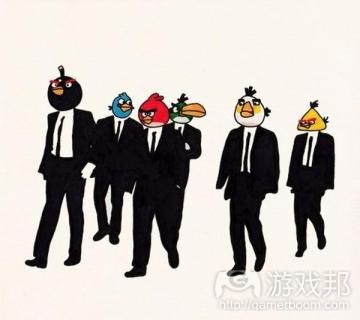
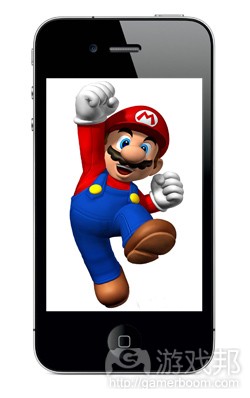
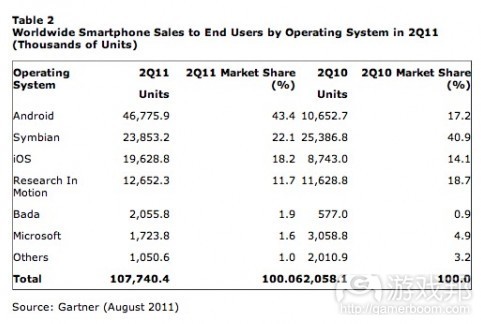

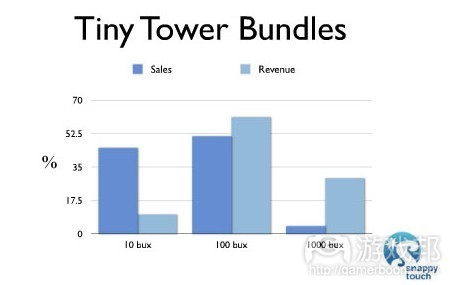


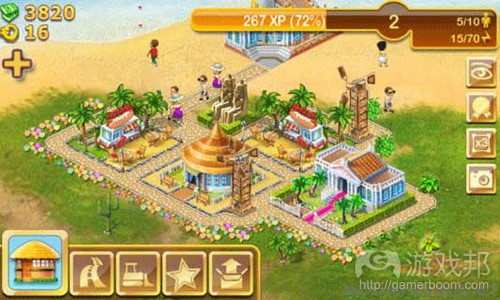
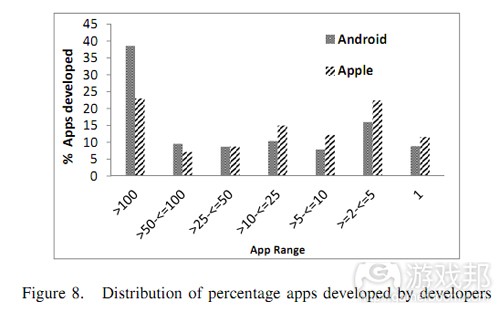
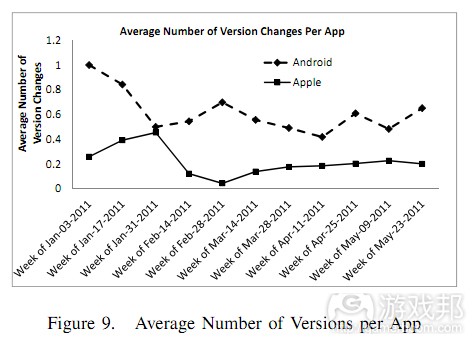
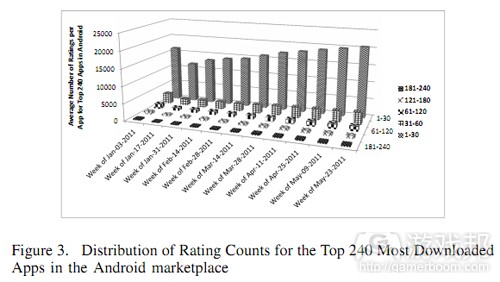














 闽公网安备35020302001549号
闽公网安备35020302001549号